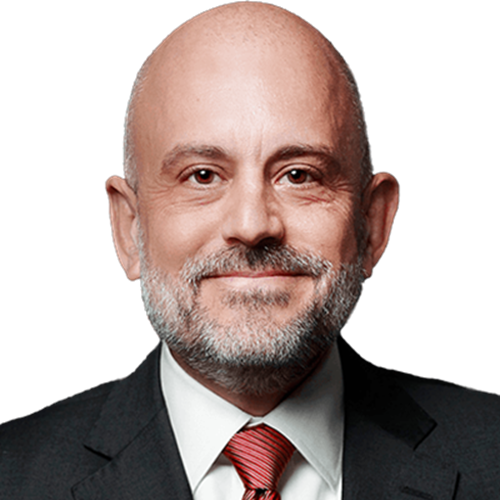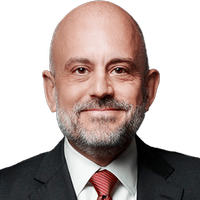Being Rich in Retirement vs. Being Happy: There’s a Difference
Money obviously plays a role, but how much you have isn’t as important as the quality of your life when it comes to health, relationships and activities.

Profit and prosper with the best of Kiplinger's advice on investing, taxes, retirement, personal finance and much more. Delivered daily. Enter your email in the box and click Sign Me Up.
You are now subscribed
Your newsletter sign-up was successful
Want to add more newsletters?

Delivered daily
Kiplinger Today
Profit and prosper with the best of Kiplinger's advice on investing, taxes, retirement, personal finance and much more delivered daily. Smart money moves start here.

Sent five days a week
Kiplinger A Step Ahead
Get practical help to make better financial decisions in your everyday life, from spending to savings on top deals.

Delivered daily
Kiplinger Closing Bell
Get today's biggest financial and investing headlines delivered to your inbox every day the U.S. stock market is open.

Sent twice a week
Kiplinger Adviser Intel
Financial pros across the country share best practices and fresh tactics to preserve and grow your wealth.

Delivered weekly
Kiplinger Tax Tips
Trim your federal and state tax bills with practical tax-planning and tax-cutting strategies.

Sent twice a week
Kiplinger Retirement Tips
Your twice-a-week guide to planning and enjoying a financially secure and richly rewarding retirement

Sent bimonthly.
Kiplinger Adviser Angle
Insights for advisers, wealth managers and other financial professionals.

Sent twice a week
Kiplinger Investing Weekly
Your twice-a-week roundup of promising stocks, funds, companies and industries you should consider, ones you should avoid, and why.

Sent weekly for six weeks
Kiplinger Invest for Retirement
Your step-by-step six-part series on how to invest for retirement, from devising a successful strategy to exactly which investments to choose.
The concept of “investing” is often associated solely with monetary pursuits. It has become synonymous with growing a portfolio, aimed at securing a future filled with affluence. However, in my experience, this one-dimensional interpretation of wealth fails to capture its full essence. Our understanding of wealth needs to evolve, going beyond the confines of financial accumulation, to encompass the necessary conditions for a well-rounded, successful retirement.
The prospect of an ideal future isn’t encapsulated by a mere stack of hundred-dollar bills. Instead, it’s shaped by the quality of life that these financial resources can provide. When there is a pursuit of wealth, money is assumed to be the definitive goal. However, what is often being pursued is the atmosphere that money can create — the lifestyle and environment we envision for our future self — that truly matters.
You could possess all the wealth in the world, but without the cornerstones of a fulfilling life such as health, income, cognitive ability, thriving relationships and a nurturing environment, its value becomes questionable. What benefit do stacks of hundred-dollar bills offer if they are not instrumental in manifesting a meaningful life?
From just $107.88 $24.99 for Kiplinger Personal Finance
Become a smarter, better informed investor. Subscribe from just $107.88 $24.99, plus get up to 4 Special Issues

Sign up for Kiplinger’s Free Newsletters
Profit and prosper with the best of expert advice on investing, taxes, retirement, personal finance and more - straight to your e-mail.
Profit and prosper with the best of expert advice - straight to your e-mail.
In this new paradigm, wealth extends beyond the mere accumulation of money. It becomes about the life you construct around it, the “atmospheric condition” you create for yourself.
Having money doesn’t automatically grant you a steady income, and even with an income, if the other crucial elements of your life are lacking, the allure of monetary wealth diminishes. This perspective underscores the idea that an ideal future isn’t marked by how much money you possess, but by the conditions you’ve cultivated around yourself.
Don’t get me wrong: Money plays an integral role, but in my 30 years of experience, I know that we need to exercise caution in our perception of wealth and the significance we ascribe to money. Instead of seeing investing solely as your contribution toward your financial future, consider it to mean an investment in your ideal future.
What does your life look like in two or three decades?
If you stop to think and imagine your life two or three decades from now, you likely see people and activities. There are activities that will occupy your time, requiring good health and cognitive abilities. The people participating alongside of you in these activities are the relationships you have invested in over time.
It is the overall “atmospheric condition” that defines your retirement and offers a keen understanding of what is genuinely important. This vision serves as a guiding light for investing in other aspects of your life that will lead to better health, nurturing relationships, a stable income and, essentially, the life you’ve envisioned for yourself.
I had a client who was very successful and was the embodiment of the rags-to-riches tale that everyone admires. I saw his commitment to the business and his pursuit of wealth. I got to know him well over the years and watched him burn the candle at both ends.
He became very wealthy and had everything he desired, but as he got closer to retirement, his health choices caught up with him. He was diagnosed with various lifestyle-related diseases, and soon his life was no longer his own. It was now governed by countless doctors’ appointments, and he became too sick to enjoy any of it.
Everything he was working toward was replaced with hospital visits. His goals for traveling the world were replaced with quiet evenings spent alone. His wealth, which was his life’s work, was now being spent on recuperating his health.
The Dalai Lama said, “Man sacrifices his health to make money. Then he sacrifices money to recuperate his health.” A healthy lifestyle lays the foundation for our capacity to live fully and pursue our ambitions actively.
Think of preventive health care as an investment
The importance of investing in health cannot be overstated. This can take the form of hiring a health coach, consulting a functional doctor, following a balanced diet or maintaining a regular exercise routine.
Instead of viewing preventive health as an expense, view it as an investment in your future self, securing the quality of life we all crave. I recorded a podcast on this recently with my good friend Regan Archibald.
Simultaneously, investing in relationships is paramount. Relationships, whether they are family, friends or romantic, all form an integral part of our emotional support system. Investing time and energy in nurturing these relationships might involve caring for others, reaching out to friends and family or investing in others through mentorship. The rewards of these investments, though not always tangible, foster emotional well-being and personal growth.
Relationships don’t have to be monetary investments, but can be an investment of time. Either way, you must be intentional, setting aside the “what’s in it for me?” attitude and committing to “what’s in it for them?” Joe Polish’s book What’s in It for Them? goes deep into how this is done.
In parallel to investing in health and relationships, investing in income is of course critical. Accumulating wealth is one thing, but ensuring a steady flow of income is another. Starting a business or acquiring income-generating assets are foundational for having a continuous fountain of cash flow that funds your lifestyle. Cash flow affords you the freedom to retire and enjoy the life you have created for yourself.
Retirement is a time of shifting from a diversification of growth assets to a diversification of income-producing assets. In my article Financial Freedom in Retirement Is All About Cash Flow, I share my thoughts on cash flow and how income is like the water that you can’t live without.
Ultimately, the true essence of investing isn’t limited to increasing your wealth. It’s about building the “atmospheric condition” that aligns with your ideal future self. It’s about nurturing your health, cultivating meaningful relationships, ensuring a steady income and fostering cognitive ability.
Money is simply a tool
As you begin to recognize this, you gain the understanding that money is simply a tool that enables us to reach these goals and is not the goal itself. Consequently, when you start thinking about an ideal future, you embark on the path to truly manifesting your ideal future self.
Retirement should be viewed not just as a time of unemployment, but as a new chapter that is ripe with potential. A successful retirement is a culmination of careful planning and wise investments in income-oriented assets, health and relationships. It’s about spending time doing things you love, being surrounded by people you cherish, enjoying robust health and having the financial security to live comfortably.
In the end, it’s the quality of your life in retirement, not the size of your bank account, that determines your satisfaction. Only then can you truly understand and appreciate the significance of investing as a means of creating not just a wealthy, but also a meaningful, lifestyle. True wealth, therefore, is not merely an abundance of money, but the presence of all the components that make life fulfilling.
For more information on creating passive income and achieving financial freedom, visit brianskrobonja.com.
Securities offered only by duly registered individuals through Madison Avenue Securities, LLC. (MAS), Member FINRA &SIPC. Advisory services offered only by duly registered individuals through Skrobonja Wealth Management (SWM), a registered investment advisor. Tax services offered only through Skrobonja Tax Consulting. MAS does not offer Build Banking or tax advice. Skrobonja Financial Group, LLC, Skrobonja Wealth Management, LLC, Skrobonja Insurance Services, LLC, Skrobonja Tax Consulting, and Build Banking are not affiliated with MAS.
Skrobonja Wealth Management, LLC is a registered investment adviser. Advisory services are only offered to clients or prospective clients where Skrobonja Wealth Management, LLC and its representatives are properly licensed or exempt from licensure.
The firm is a registered investment adviser with the state of Missouri, and may only transact business with residents of those states, or residents of other states where otherwise legally permitted subject to exemption or exclusion from registration requirements. Registration with the United States Securities and Exchange Commission or any state securities authority does not imply a certain level of skill or training.
The appearances in Kiplinger were obtained through a PR program. The columnist is not affiliated with, nor endorsed by Kiplinger. Kiplinger did not compensate the columnist in any way.
Profit and prosper with the best of Kiplinger's advice on investing, taxes, retirement, personal finance and much more. Delivered daily. Enter your email in the box and click Sign Me Up.

Brian Skrobonja is a Chartered Financial Consultant (ChFC®) and Certified Private Wealth Advisor (CPWA®), as well as an author, blogger, podcaster and speaker. He is the founder and president of a St. Louis, Mo.-based wealth management firm. His goal is to help his audience discover the root of their beliefs about money and challenge them to think differently to reach their goals. Brian is the author of three books, and his Common Sense podcast was named one of the Top 10 podcasts by Forbes. In 2017, 2019, 2020, 2021 and 2022, Brian was awarded Best Wealth Manager. In 2021, he received Best in Business and the Future 50 in 2018 from St. Louis Small Business.
-
 Dow Adds 1,206 Points to Top 50,000: Stock Market Today
Dow Adds 1,206 Points to Top 50,000: Stock Market TodayThe S&P 500 and Nasdaq also had strong finishes to a volatile week, with beaten-down tech stocks outperforming.
-
 Ask the Tax Editor: Federal Income Tax Deductions
Ask the Tax Editor: Federal Income Tax DeductionsAsk the Editor In this week's Ask the Editor Q&A, Joy Taylor answers questions on federal income tax deductions
-
 States With No-Fault Car Insurance Laws (and How No-Fault Car Insurance Works)
States With No-Fault Car Insurance Laws (and How No-Fault Car Insurance Works)A breakdown of the confusing rules around no-fault car insurance in every state where it exists.
-
 For the 2% Club, the Guardrails Approach and the 4% Rule Do Not Work: Here's What Works Instead
For the 2% Club, the Guardrails Approach and the 4% Rule Do Not Work: Here's What Works InsteadFor retirees with a pension, traditional withdrawal rules could be too restrictive. You need a tailored income plan that is much more flexible and realistic.
-
 Retiring Next Year? Now Is the Time to Start Designing What Your Retirement Will Look Like
Retiring Next Year? Now Is the Time to Start Designing What Your Retirement Will Look LikeThis is when you should be shifting your focus from growing your portfolio to designing an income and tax strategy that aligns your resources with your purpose.
-
 I'm a Financial Planner: This Layered Approach for Your Retirement Money Can Help Lower Your Stress
I'm a Financial Planner: This Layered Approach for Your Retirement Money Can Help Lower Your StressTo be confident about retirement, consider building a safety net by dividing assets into distinct layers and establishing a regular review process. Here's how.
-
 The 4 Estate Planning Documents Every High-Net-Worth Family Needs (Not Just a Will)
The 4 Estate Planning Documents Every High-Net-Worth Family Needs (Not Just a Will)The key to successful estate planning for HNW families isn't just drafting these four documents, but ensuring they're current and immediately accessible.
-
 Love and Legacy: What Couples Rarely Talk About (But Should)
Love and Legacy: What Couples Rarely Talk About (But Should)Couples who talk openly about finances, including estate planning, are more likely to head into retirement joyfully. How can you get the conversation going?
-
 How to Get the Fair Value for Your Shares When You Are in the Minority Vote on a Sale of Substantially All Corporate Assets
How to Get the Fair Value for Your Shares When You Are in the Minority Vote on a Sale of Substantially All Corporate AssetsWhen a sale of substantially all corporate assets is approved by majority vote, shareholders on the losing side of the vote should understand their rights.
-
 How to Add a Pet Trust to Your Estate Plan: Don't Leave Your Best Friend to Chance
How to Add a Pet Trust to Your Estate Plan: Don't Leave Your Best Friend to ChanceAdding a pet trust to your estate plan can ensure your pets are properly looked after when you're no longer able to care for them. This is how to go about it.
-
 Want to Avoid Leaving Chaos in Your Wake? Don't Leave Behind an Outdated Estate Plan
Want to Avoid Leaving Chaos in Your Wake? Don't Leave Behind an Outdated Estate PlanAn outdated or incomplete estate plan could cause confusion for those handling your affairs at a difficult time. This guide highlights what to update and when.
